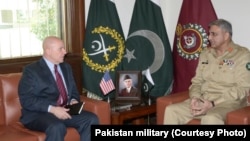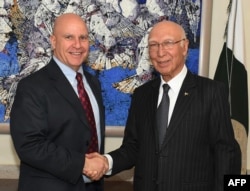U.S. National Security Adviser H.R. McMaster concluded Monday a daylong trip to Pakistan where he met civilian and military leaders to stress "the need to confront terrorism in all its forms" and reviewed efforts aimed at stabilizing neighboring Afghanistan.
McMaster visited Islamabad, a day after holding talks with Afghan leaders in Kabul to review and assess the situation with regard to the U.S. military’s counterinsurgency and counterterrorism missions in the country.
He met with Pakistani Prime Minister Nawaz Sharif and his top foreign policy aides before holding talks with the country’s powerful military chief, Gen. Qamar Javed Bajwa.
Sharif’s office later issued a statement welcoming the first formal high-level exchange between the United States and Pakistan under the Trump administration.
“Sharing his concerns over the deteriorating security situation in Afghanistan and the continuing impasse, the prime minister conveyed Pakistan’s readiness to work with the International community to explore ways in which the Afghan crisis can be resolved,” the statement said.
In a separate statement of its own, the U.S. Embassy said McMaster “expressed appreciation for Pakistan’s democratic and economic development and stressed the need to confront terrorism in all its forms.”
This is McMaster's first trip to the region since becoming President Donald Trump's national security adviser, and it comes in the wake of calls by military commanders for adding “several thousand” troops to the 8,400 U.S. forces already in Afghanistan to help break the "stalemate" in the battle with the Taliban.
No comment on more US troops
Speaking to a local Afghan television station after concluding his meetings in Kabul, McMaster withheld comments on whether a new strategy the Trump administration is putting together will include a boost to American troop strength in Afghanistan.
"Well, part of the new strategy will be what the president decides it is. What we are doing here is to…President Trump to decide, really, what is the best course of action to begin to accelerate progress in the war and to help bring lasting peace and security to the Afghan people," the American adviser told TOLOnews.
He also had a message for leaders in Pakistan, whom Afghan officials accuse of permitting Taliban insurgents to establish sanctuaries and conduct attacks into Afghanistan with the help of Pakistan's intelligence agency.
Strained relationship
“As all of us have hoped for many many years, we have hoped that Pakistani leaders will understand that it is in their interest to go after these groups less selectively than they have in the past and the best way to pursue their interests in Afghanistan and elsewhere is through diplomacy not through the use of proxies that engage in violence,” McMaster said.
Pakistani officials reject allegations of harboring the Taliban and maintain recent counterterrorism operations have dismantled terrorism infrastructure, particularly in border areas. Islamabad insists the insurgents have fled to dozens of Afghan districts currently controlled by the Taliban.
Charges and counter-charges with regard to sheltering anti-state militants and sponsoring terrorist attacks against each other have in recent years damaged relations between Afghanistan and Pakistan.





